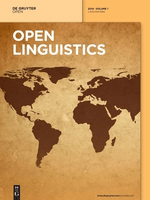
Open Linguistics
Scope & Guideline
Exploring the depths of language research without barriers.
Introduction
Aims and Scopes
- Multilingualism and Language Contact:
The journal focuses on the dynamics of multilingual settings, exploring how languages interact and influence each other in various sociocultural contexts. - Discourse Analysis and Pragmatics:
A significant emphasis is placed on the analysis of discourse functions, pragmatic markers, and conversational dynamics across different languages. - Typological and Comparative Linguistics:
The journal includes typological surveys and comparative studies that investigate linguistic features across diverse languages, contributing to a broader understanding of linguistic universals and variations. - Translation Studies and Linguistic Accessibility:
Open Linguistics explores translation practices, including sociolinguistic factors affecting translation and the implications for linguistic accessibility in diverse contexts. - Sociolinguistics and Language Policy:
The journal engages with sociolinguistic research, examining language attitudes, identity, and the impact of language policies on communities. - Cognitive and Experimental Linguistics:
Studies that integrate cognitive factors and experimental methodologies to investigate language processing and usage are also prominent in the journal.
Trending and Emerging
- Discourse and Interactional Linguistics:
There is an increasing focus on the nuances of discourse, including the analysis of conversational strategies and interactional dynamics across various languages. - Cultural and Linguistic Landscapes:
Emerging studies examine the linguistic landscapes of specific cultural enclaves, highlighting the interplay between language, identity, and social space. - Language and Technology:
Research exploring the intersection of language and technology, including machine translation and computational linguistics, is gaining traction within the journal. - Gender and Language:
The journal is increasingly publishing studies that investigate the impact of gender on language use, including code-switching and language attitudes. - Multimodality in Communication:
There is a growing interest in multimodal communication, examining how language interacts with other modalities such as gesture, visual elements, and social cues. - Ideophones and Expressive Language:
Research into ideophones and other expressive forms of language is on the rise, reflecting a broader interest in non-standard linguistic expressions.
Declining or Waning
- Traditional Syntax Studies:
While syntax remains a core area, there appears to be a waning focus on traditional syntactic frameworks in favor of more integrative approaches that combine syntax with discourse and pragmatics. - Historical Linguistics:
Research centered on historical linguistics and diachronic studies has seen a decrease, possibly overshadowed by current sociolinguistic and contact-based studies. - Phonetics and Phonology:
Although still relevant, there is a noticeable reduction in standalone phonetic and phonological analyses, with more studies integrating these aspects into broader discourse or sociolinguistic frameworks. - Language Endangerment and Revitalization:
Interest in language endangerment topics has diminished, possibly due to a shift towards more immediate sociolinguistic issues and multilingualism. - Standard Language Ideology:
Discussions around standard language ideologies have become less frequent, as the focus has shifted towards more nuanced understandings of language variation and identity.
Similar Journals

LINGUISTIQUE
Advancing Research in Language StudiesLINGUISTIQUE, an esteemed journal published by PRESSES UNIV FRANCE, serves as a vital platform for scholarly discourse in the fields of linguistics and language studies. With its ISSN 0075-966X and E-ISSN 2101-0234, this French journal has been a significant contributor to the understanding of linguistic phenomena since its inception in 2004, and it continues its journey through to 2024. Although currently categorized in the Q4 quartile for both Arts and Humanities (miscellaneous) and Linguistics and Language, its commitment to publishing quality research encourages a diverse range of articles, reviews, and innovative studies. Positioned in the 32nd and 29th percentiles for its respective fields according to Scopus rankings, LINGUISTIQUE is dedicated to advancing knowledge and stimulating engagement among researchers, professionals, and students alike. While it does not offer open access, the journal remains an essential resource for those who seek to deepen their understanding of linguistic principles in a global context, facilitating a richer discourse that connects theory with practice.
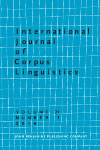
International Journal of Corpus Linguistics
Unveiling Insights from Language DataThe International Journal of Corpus Linguistics, published by John Benjamins Publishing Co, is a premier academic journal dedicated to advancing the field of corpus linguistics. With an ISSN of 1384-6655 and an E-ISSN of 1569-9811, this journal serves as a pivotal platform for researchers and practitioners alike to explore the intricate relationships between language and corpora. Housed in the Netherlands and operating within the prestigious Q1 category in Linguistics and Language, the journal boasts impressive Scopus rankings, positioning it in the top percentiles of both Arts and Humanities and Social Sciences. Its commitment to rigorous peer-reviewed scholarship not only enhances understanding in the domain but also fosters collaboration among scholars. With coverage spanning from 1996 to 2024, the journal publishes cutting-edge research that contributes valuable insights into linguistic patterns and empirical studies. Whether you're an established researcher or a student embarking on your academic journey, the International Journal of Corpus Linguistics is an essential resource for anyone seeking to deepen their understanding of language through corpora.
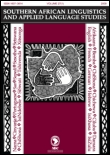
Southern African Linguistics and Applied Language Studies
Navigating Language Dynamics in a Diverse RegionSouthern African Linguistics and Applied Language Studies is a prestigious journal dedicated to the exploration and analysis of linguistics and applied language studies within the Southern African context. Published by Taylor & Francis Ltd, this esteemed journal has established itself as a significant platform for scholars and practitioners since its inception in 2003. With an impressive Q2 ranking in the Linguistics and Language category and a current Scopus rank of #430 out of 1167, it occupies a vital position in the academic landscape, appealing to a diverse readership keen on linguistic research, language policy, and applied linguistics. While the journal is not currently open access, it provides comprehensive insights and scholarly articles that foster understanding and innovation in linguistic practices and language education. As of 2024, the journal continues to deepen its impact through rigorous peer-review and a commitment to advancing knowledge, making it a key resource for researchers, educators, and students seeking to navigate the complexities of language within the Southern African region and beyond.

Cadernos de Estudos Linguisticos
Innovating the study of language for tomorrow's scholars.Cadernos de Estudos Linguisticos, published by UNIV ESTADUAL CAMPINAS, INST ESTUDOS LINGUAGEM, stands as a pivotal platform in the field of linguistic studies since its inception in 1978. With its commitment to Open Access, this journal fosters the dissemination of cutting-edge research, ensuring that knowledge is accessible to a global audience. This also enhances collaboration among researchers, professionals, and students dedicated to exploring the nuances of language. The journal proudly carries the ISSN 0102-5767 and E-ISSN 2447-0686, attesting to its uninterrupted quality and relevance in linguistic scholarship. By addressing various facets of language studies, including syntax, semantics, and sociolinguistics, this esteemed journal is a vital resource for advancing understanding and innovation in the field.

Taiwan Journal of Linguistics
Advancing Linguistic Insights from Taiwan and BeyondTaiwan Journal of Linguistics, published by CRANE PUBL CO, is a prominent Open Access journal dedicated to the field of linguistics since its inception in 2003. With its ISSN 1729-4649 and E-ISSN 1994-2559, this journal serves as a vital platform for the dissemination of significant research and scholarly discussions from Taiwan and beyond. The journal particularly focuses on advancing knowledge in linguistic theory, language acquisition, phonetics, and sociolinguistics, catering to a diverse academic audience including researchers, professionals, and students. Although it currently holds a Q4 ranking in the Linguistics and Language category, the journal's commitment to quality and accessibility positions it as an emerging resource for those engaged in language studies. Currently ranked #584 in Arts and Humanities and #668 in Social Sciences, it provides critical insights and fosters scholarly exchanges that enhance understanding within the field. The journal's open access model ensures the broadest reach for its published articles, facilitating the global sharing of linguistic research. For more information, visit the journal’s website to explore its latest publications and submission guidelines.
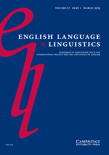
English Language & Linguistics
Exploring the Depths of Language and LinguisticsEnglish Language & Linguistics is a prestigious journal published by Cambridge University Press, specializing in the dynamic fields of linguistics and language studies. With an impressive Q1 ranking in both Linguistics and Language categories for 2023 and a notable placement in the Scopus metrics, where it ranks #142 out of 1088 in Arts and Humanities, the journal is recognized for its high-quality research contributions and robust impact in the scholarly community. Since its inception in 1997, English Language & Linguistics has provided a forum for researchers to explore various aspects of language, facilitating the dissemination of innovative ideas and empirical studies. With no open access options currently available, the journal remains a valuable resource within the United Kingdom and beyond, fostering a deeper understanding of language intricacies and their broader societal implications. For practitioners and academicians alike, this journal is a critical resource for keeping abreast of the latest advancements in linguistics.

Revue Roumaine de Linguistique-Romanian Review of Linguistics
Empowering Linguists to Share Their Discoveries.Revue Roumaine de Linguistique-Romanian Review of Linguistics, published by EDITURA ACAD ROMANE, is a distinguished journal dedicated to advancing the field of linguistics and promoting scholarly discourse in language-related research. With its ISSN 0035-3957, this journal has established itself as a valuable resource for researchers and practitioners alike, particularly within the linguistics and language categories where it holds a respectable Q3 ranking as of 2023. The journal covers a wide array of topics, focusing on both theoretical and applied linguistics, making it an essential platform for those interested in the latest developments, methodologies, and findings in the field. Although it currently does not operate under an open access model, the Romanian Review of Linguistics remains an impactful publication with its regular convergence of years from 2010 to 2023, providing a comprehensive archive for ongoing research endeavors. With its address located in Bucuresti, Romania, this journal continues to foster a vibrant academic community and supports the ongoing exploration of linguistic phenomena across diverse contexts.
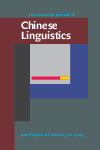
International Journal of Chinese Linguistics
Elevating Chinese Linguistics to Global StandardsInternational Journal of Chinese Linguistics is a distinguished publication that delves into various aspects of linguistic studies pertaining to the Chinese language. Published by John Benjamins Publishing Co, this journal stands out for its commitment to advancing the knowledge and understanding of Chinese linguistics within the global academic community. With an impact factor that places it in the Q2 quartile of linguistics and language, the journal is indexed in prominent databases, achieving ranks of #501 in Arts and Humanities and #580 in Social Sciences. These rankings reflect the journal's dedication to maintaining high scholarly standards and its relevance in both linguistic research and practical applications. While not categorized as Open Access, the journal provides necessary access through institutional subscriptions, thereby ensuring that valuable research reaches a broad audience. Covering a wide range of topics from syntax and phonetics to sociolinguistics and applied linguistics, the International Journal of Chinese Linguistics serves as an essential resource for researchers, professionals, and students seeking to deepen their understanding of the intricate relationship between language and culture in the Chinese context. With converging years from 2019 to 2024, it continues to evolve, reflecting ongoing developments in the field.

Estudios de Linguistica-Universidad de Alicante-ELUA
Elevating Linguistics: Where Research Meets AccessibilityEstudios de Linguistica-Universidad de Alicante-ELUA is a distinguished academic journal dedicated to advancing the field of linguistics, published by Universidad de Alicante. With an Open Access model adopted since 2020, ELUA facilitates greater accessibility to pioneering research for scholars and enthusiasts alike. The journal's ISSN is 0212-7636 and its E-ISSN is 2171-6692, ensuring it is indexed and easily discoverable in academic databases. Though the journal's H-Index is currently not specified, its commitment to disseminating high-quality linguistics research positions it as a valuable resource for researchers, professionals, and students. The journal aims to foster scholarly dialogue and innovation in various linguistic domains, making it an essential platform for sharing insights and findings that shape contemporary linguistic studies. Based in Alicante, Spain, ELUA is poised to contribute significantly to the global linguistics landscape.

Language and Linguistics Compass
Illuminating Trends in Language StudiesLanguage and Linguistics Compass, published by Wiley, stands as a premier journal in the field of linguistics, showcasing innovative and interdisciplinary research. With its ISSN 1749-818X and E-ISSN matching, the journal has built a robust reputation, achieving an impressive Q1 ranking within the linguistics category for 2023, placing it in the top 4% of its field. Its Scopus rank of 48 out of 1167 highlights its influence and significance among linguistics journals, boasting a commendable 95th percentile. This journal serves as a vital resource for researchers, professionals, and students, offering a wide range of accessible articles that illuminate current trends and advances within the domain of language studies. Although it is not Open Access, the journal is committed to quality and diversity in its publications, ensuring scholarly articles from various sub-disciplines of linguistics are represented from 2008 through 2024. Located in the United Kingdom, Language and Linguistics Compass invites contributions from around the globe, reinforcing its status as a leading forum for linguistic discourse.